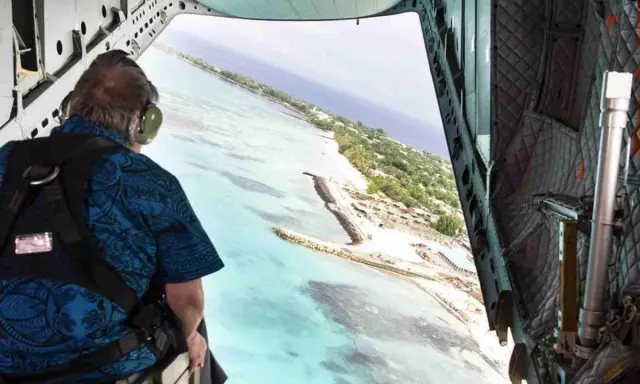Tuvalu has endorsed, in principle, a national adaptation plan to address the existential threat posed by climate change on the Pacific island nation.
The proposal was presented to Prime Minister Feleti Teo and his Cabinet by the Nanumea Salvation Seawall Group, comprising locals and Tuvaluans living overseas.
Teo was elected unopposed by parliament in February and during his first address to the nation, he said the climate crisis remained the biggest concern for Tuvalu.
Teo, the former executive director of the Western & Central Pacific Fisheries Commission, has welcomed the Nanumea group’s initiative.
PMN Tuvalu producer Fala Haulangi is part of that group and said they met with Teo and his Cabinet last week to discuss the project.
Haulangi told Pacific Mornings that the proposal involved building a seawall across the island.
She said their plan was well received by the prime minister and his team.
“Nanumea is one of the islands in Tuvalu and we are right up north, so we call ourselves the Nanumea Salvation Seawall Project Team. It was formed in 2012. I joined early this year.
“So this group started to come together and thinking like, we are sick and tired of the palagi foreigners who come and tell the Tuvaluans like ‘hey let’s do this, let’s build a sea wall. But then those things don’t last long, to be honest.
“I’ve seen it and I’ve heard from people. So, this diaspora, people who are no longer living here said why don’t we get together because we do have brains? Our people have the experience to do this.”
Haulangi said the group was established about 12 years ago and in 2019, Tuvaluans at home welcomed the group, saying it was authorised to start looking at ways to help the island not go underwater.
“So that’s why we travelled from New Zealand, Australia, Fiji, and some of us who are part of the group are already here. They live here.
“So we met with the Prime Minister last week and he really loved the whole concept. It’s mainly around how we deal with soil erosion. How do we deal with the sea-level rising and the infrastructure?”
Haulangi’s uncle, who is a civil engineer, is the leader of the group.
She said they named the concept ‘hard engineering’, adding that while the concept had been used around the world, the plan they presented to the government last Thursday was “new thinking, a new concept.
“And so they [government] took it on board. My island is only about 3.5sqkm in terms of land mass. So we are looking at increasing that and building a seawall right around the island but in three layers. There’s a breaker, there’s a gap, whereas the other was straight on the sea wall.
“The other issue is the islands always run out of water. The islands depend a lot on rain. So we came up with the concept to build the sea wall like tanks so the rainwater is captured within the seawall, so we can cage it for the whole island for about 15 years if we do go ahead with that.
“If we look at the eight islands of Tuvalu as well as the other seven islands, we will be able to provide them with water for the whole two years.
“We also looked at reclaimed land and the infrastructure as well.”
The prime minister said it was a “great concept”
She said the government has prioritised 21 things including climate change and how Tuvalu could address it.
Haulangi said the prime minister suggested the group aligned itself with those two priorities and the sustainable goals for the United Nations.
“The prime minister made the executive decision just by looking at the presentation. ‘Now that makes sense. It aligns with those priorities that we’re looking at in the United Nations sustainable goals as well. So I am going to endorse that, the concept and let’s look at it.”
She said the group would work with Climate Change Minister Dr Maina Talia on a feasibility study.
Haulangi said she also “caught up” with a team from the Secretariat of the Pacific Regional Environment Programme or SPREP who was in Funafuti for a meeting.
She said the discussions included waste management and recycling, among other things.
Tuvalu wants a deep sea mining precautionary pause and called on the International Seabed Authority (ISA) to support the move.
A total of 31 nations have backed a precautionary pause or moratorium on seabed mining developments with officials saying there is not enough scientific information to understand the “complex web of life” in the deep ocean.
For Tuvalu, which lies 3765km north of New Zealand, the ocean is the key denominator for sustainable development and the foundation of economic development.
The Tuvalu government says it is concerned that any additional pressures from other anthropogenic activities will further intensify the existential threat that its people are facing.
In 2022, Tuvalu ended its support for Circular Metals Ltd to explore seabed mining in the country’s waters.
It’s been two decades since Fala Haulangi last visited her island home.
She returned to Funafuti last week for the first time after 20 years and said it was quite overwhelming.
“It’s good to be back home after 20 years. Unbelievable, but hey, I’m here. Praise God. There have been a lot of changes, especially on the mainland, and trying to remember the homes near where I grew up.
“And there were quite a few containers. That’s what I see you know those big containers. But the hospitality is still the same. Tuvalu people are still generous and giving and smiling and greeting you everywhere you go.” said Haulangi.














